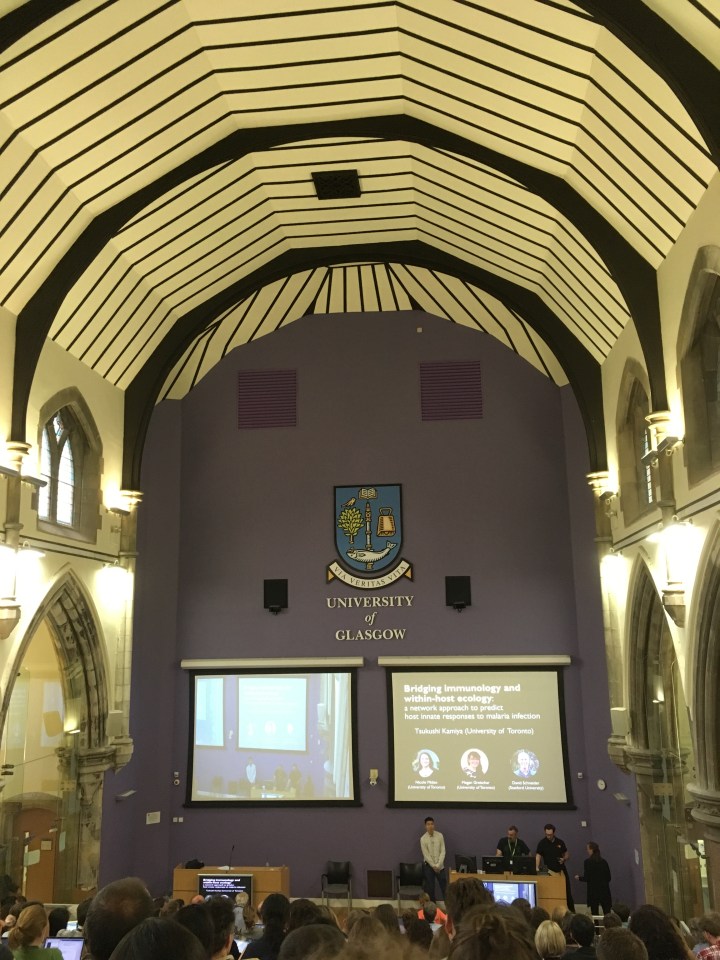A few weeks ago, Dr Lauren White from the University of Minnesota told us about the intersection of wildlife conservation, disease and human health for Endangered Species Day. Now she is back to give us a recap of the Ecology & Evolution of Infectious Disease Conference recently held in Glasgow – including some pretty nifty conference events complete with a Scottish flair!
This year, the 16th Ecology and Evolution of Infectious Diseases Conference (EEID) took place from May 29th to June 1st 2018 at the University of Glasgow, Scotland. I have attended the EEID conference annually for the past four years as a Ph.D. student. As a disease ecologist, I have found it to be both my favorite and the most relevant conference for my research interests. Its single session format makes for a shared experience among conference participants and great science discussions. Poster sessions are interactive and well attended. Its smaller size also means that you are just as likely to rub elbows with fellow grad students, as a preeminent researcher in the field.

The quality of science, inclusiveness, and lack of hierarchy is a definite draw for attendees at all career stages. “This is a meeting where full professors readily talk to graduate students about their science. My first EEID was as a graduate student, and I really appreciated that several professors came by my poster and spent quite a bit of time talking with me. Now that I am a professor myself, I always try and take the time to chat with graduate students about their work,” shared Dr. Dana Hawley, a professor at Virginia Tech and a presenter at this year’s EEID. Katherine Worsley-Tonks, a Ph.D. student from the University of Minnesota, agreed, ” I love coming to EEID, obviously because of the topics covered, but also because it is a fairly small conference, which means that there are numerous opportunities to meet new researchers and to continue networking with them throughout the three-day period.”
In its sixteen years, this is the first time that EEID has taken place outside of the United States. For some conference goers like Dr. Pedro Vale, professor at the University of Edinburgh, this transatlantic change finally made attending EEID feasible. “Having [EEID] in Glasgow was very convenient, but above all moving it outside the U.S. meant that a different group of people were able to attend, some for the first time. Glasgow has a great community of disease ecologists, and this was reflected in the programme.”

The conference began on Tuesday night with an opening reception at the Glasgow Botanic Gardens in the historical Kibble Palace where Dr. Roman Biek from the University of Glasgow made opening remarks. Over the next two days, talks took place in the beautiful Sir Charles Wilson building at the University of Glasgow. The conference centered around four main themes: (1) disease control interventions and real-world applications of disease ecology and evolution; (2) host shifts and disease emergence; (3) genomics and big data in disease ecology and evolution; and (4) within-host dynamics: co-infection to wild immunology.
With the conference program, this year organizers offered a sampling of translational research that links research to policy, along with applied research that cuts across disciplines. For instance, Dr. Rosie Woodroffe from the Zoological Society of London presented a rousing talk on how implementing evidence-based policies for badger culling to control bovine tuberculosis has been complicated by public perception and cherry picking of evidence. Amy Sweeny, a Ph.D. student at the University of Edinburgh and a presenter at this year’s conference, noted, “Rosie did an incredible job showcasing how crucial translating research to policy is using concrete examples. So often it is difficult to bridge that gap but she did that well and in great style.”
This year the conference organizers also revived poster pitches – permitting presenters a mere 30 seconds to make a compelling argument for why other attendees should visit their poster. This was a traditional part of earlier conferences, but has not been employed in recent years. Presenters that exceeded their 30 second allotment were cut off with a very Scottish, “Haud yer wheesht!” Some science puns and rhymes ensued, including a delightful couplet about parasites in Rum deer by Greg Albery, a Ph.D. student at the University of Edinburgh.
Dr. Meggan Craft, professor at the University of Minnesota, observed, “The organizers did a great job of creating a thoughtful and cutting edge scientific program that had equal representation from men and women as well as speaking roles from a good mix of Ph.D. students, postdocs, and faculty. The poster pitches were a hit also – it is great to quickly associate a scientific topic with someone’s face in order to facilitate follow-up networking.” Sweeny also found the poster sessions to be a high point, “There was such a wide range of career stages and fantastic topics presented that it made for wonderful discussions both while giving a poster and observing. The pitches added a fun element as well and made the sessions feel very conversational.”
For many, a highlight of the meeting was the closing dinner, which was held at the beautiful and eclectic Kelvingrove Museum. A traditional Scottish cèilidh followed dinner. “I think the cèilidh perfectly captured the inclusive and fun spirit of the meeting.” said Dr. Hawley.
An annual tradition for EEID is for participants to go on a hike the last day of the conference. This year many intrepid conference attendees spent Friday hiking to Conic Hill near Balmaha with dramatic views of Loch Lomond. Following the hike, some attendees also enjoyed a distillery tour at Glengoyne Distillery, just outside of Glasgow.
The next EEID conference will be held from June 10th to June 13th, 2019 at Princeton University, and the following year, EEID will continue to expand its home range by traveling to Montpelier, France in 2020.

Reblogged this on Lauren A. White.